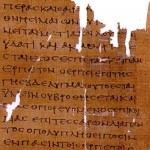Preaching in the LXX (Old Testament): Joel-Daniel
In this series, I plan to examine the use of the term κηρύσσω (kerusso – usually translated “preach”) in the Old Testament. Specifically, I will examine the use of the term “preach” in the Septuagint (LXX), the Greek translation of the Old Testament.
In this post, I’ll examine the following uses of the term κηρύσσω (kerusso – usually translated “preach”): Joel 1:14; 2:1, 15; 4:9; Jonah 1:2; 3:2, 4, 5, 7; Zephaniah 3:14; 9:9; Isaiah 61:1; Daniel 3:4. Similarly, there are five uses of the term κηρύσσω (kerusso – “preach”) in the non-canonical books which are usually included in the Greek translation of the Old Testament. I will also look at the uses of the term κηρύσσω (kerusso – “preach”) in 1 Esdras 2:1; 1 Maccabees 5:49; 10:63, 64; Psalms of Solomon 11:1. Here are the passages:
Consecrate a fast; call [preach] a solemn assembly. Gather the elders and all the inhabitants of the land to the house of the LORD your God, and cry out to the LORD. (Joel 1:14 ESV)
Blow a trumpet in Zion; sound [preach] an alarm on my holy mountain! Let all the inhabitants of the land tremble, for the day of the LORD is coming; it is near… (Joel 2:1 ESV)
Blow the trumpet in Zion; consecrate a fast; call [preach] a solemn assembly; gather the people. Consecrate the congregation; assemble the elders; gather the children, even nursing infants. Let the bridegroom leave his room, and the bride her chamber. (Joel 2:15-16 ESV)
Proclaim [preach] this among the nations: Consecrate for war; stir up the mighty men. Let all the men of war draw near; let them come up. (Joel 4:9 ESV)
“Arise, go to Nineveh, that great city, and call out [preach] against it, for their evil(1 has come up before me.” (Jonah 1:2 ESV)
Then the word of the LORD came to Jonah the second time, saying, “Arise, go to Nineveh, that great city, and call out [preach] against it the message that I tell you.” So Jonah arose and went to Nineveh, according to the word of the LORD. Now Nineveh was an exceedingly great city, three days’ journey in breadth. Jonah began to go into the city, going a day’s journey. And he called out [preached], “Yet forty days, and Nineveh shall be overthrown!” And the people of Nineveh believed God. They called [preached] for a fast and put on sackcloth, from the greatest of them to the least of them. The word reached the king of Nineveh, and he arose from his throne, removed his robe, covered himself with sackcloth, and sat in ashes. nd he issued a proclamation [preached] and published through Nineveh, “By the decree of the king and his nobles: Let neither man nor beast, herd nor flock, taste anything. Let them not feed or drink water, but let man and beast be covered with sackcloth, and let them call out mightily to God. Let everyone turn from his evil way and from the violence that is in his hands. Who knows? God may turn and relent and turn from his fierce anger, so that we may not perish.” (Jonah 3:2-7 ESV)
Sing aloud, O daughter of Zion; shout [preach], O Israel! Rejoice and exult with all your heart, O daughter of Jerusalem! (Zephaniah 3:14 ESV)
Rejoice greatly, O daughter of Zion! Shout [preach] aloud, O daughter of Jerusalem! behold, your king is coming to you; righteous and having salvation is he, humble and mounted on a donkey, on a colt, the foal of a donkey. (Zephaniah 9:9 ESV)
The Spirit of the Lord GOD is upon me, because the LORD has anointed me to bring good news to the poor; he has sent me to bind up the brokenhearted, to proclaim [preach] liberty to the captives, and the opening of the prison to those who are bound… (Isaiah 61:1 ESV)
And the herald proclaimed [preached] aloud, “You are commanded, O peoples, nations, and languages… (Daniel 3:4 ESV)
Then Belshazzar gave the command, and Daniel was clothed with purple, a chain of gold was put around his neck, and a proclamation was made [it was preached] about him, that he should be the third ruler in the kingdom. (Daniel 5:29 ESV)
These passages are from the non-canonical books:
In the first year of Cyrus king of the Persians, that the word of the Lord might be accomplished, that he had promised by the mouth of Jeremy; The Lord raised up the spirit of Cyrus the king of the Persians, and he made proclamation [preached] through all his kingdom, and also by writing, Saying, Thus saith Cyrus king of the Persians; The Lord of Israel, the most high Lord, hath made me king of the whole world… (1 Esdras 2:1ff)
Wherefore Judas commanded a proclamation [preaching] to be made throughout the host, that every man should pitch his tent in the place where he was. (1 Maccabees 5:49)
And he made him sit by himself, and said into his princes, Go with him into the midst of the city, and make proclamation [preach], that no man complain against him of any matter, and that no man trouble him for any manner of cause. Now when his accusers saw that he was honored according to the proclamation [preaching], and clothed in purple, they fled all away. (1 Maccabees 10:63-64)
Sound the trumpet in Zion, the signal for the saints! Proclaim [preach] in Jerusalem the voice of one bringing good news for God became merciful to Israel in watching over them. (Psalms of Solomon 11:1)
As in the previous passages (Genesis-Micah), it is clear that the usages of the term κηρύσσω (kerusso) in the passages above do not bear close resemblance to any of the modern definitions of the English word “preach”. Instead, once again, the usages are closer to the modern English verb “announce”.
Notice particularly the passages in Jonah chapter 3, where Jonah makes an announcement, the people of Nineveh make an announcement, and finally the king of Nineveh makes an announcement. This passage would not make since with any of our modern definitions of “preach”.
The only exception would be in Zephaniah, where the usage of the word κηρύσσω (kerusso) is closer to the English word “shout”. While some preachers are shouters, “shout” is not one of the modern definitions of the English word “preach” either.
Of particular interest would be the passage from Isaiah (61:1) since Jesus quotes this passage as one of the purposes of his time on earth. In the next post in this series, I’ll examine various passages in the New Testament (including those that quote Isaiah 61:1) to see if “announce” might be a better translation of κηρύσσω (kerusso).
—————————————————
“Preaching” in the LXX (Old Testament) Series:
Preaching in the LXX (Old Testament): Genesis-Micah
In this series, I plan to examine the use of the term κηρύσσω (kerusso – usually translated “preach”) in the Old Testament. Specifically, I will examine the use of the term “preach” in the Septuagint (LXX), the Greek translation of the Old Testament.
In this post, I’ll examine the following uses of the term κηρύσσω (kerusso – usually translated “preach”): Genesis 41:43; Exodus 32:5; 36:6; 2 Kings 10:20; 2 Chronicles 20:3; 24:9; 36:22; Esther 6:9, 11; Proverbs 1:21; 8:1; Hosea 5:8; Micah 3:5. Here are the passages:
Then Pharaoh took his signet ring from his hand and put it on Joseph’s hand, and clothed him in garments of fine linen and put a gold chain about his neck. And he made him ride in his second chariot. And they called out [preached] before him, “Bow the knee!” Thus he set him over all the land of Egypt. (Genesis 41:42-43 ESV)
When Aaron saw this, he built an altar before it. And Aaron made proclamation [preached] and said, “Tomorrow shall be a feast to the LORD.” (Exodus 32:5 ESV)
So Moses gave command, and word was proclaimed [preached]throughout the camp, “Let no man or woman do anything more for the contribution for the sanctuary.” So the people were restrained from bringing, for the material they had was sufficient to do all the work, and more. (Exodus 36:6-7 ESV)
And Jehu ordered, “Sanctify a solemn assembly for Baal.” So they proclaimed [preached] it. (2 Kings 10:20 ESV)
Then Jehoshaphat was afraid and set his face to seek the LORD, and proclaimed [preached] a fast throughout all Judah. (2 Chronicles 20:3 ESV)
So the king commanded, and they made a chest and set it outside the gate of the house of the LORD. And proclamation [preached] was made throughout Judah and Jerusalem to bring in for the LORD the tax that Moses the servant of God laid on Israel in the wilderness. (2 Chronicles 24:8-9 ESV)
Now in the first year of Cyrus king of Persia, that the word of the LORD by the mouth of Jeremiah might be fulfilled, the LORD stirred up the spirit of Cyrus king of Persia, so that he made a proclamation [preached] throughout all his kingdom and also put it in writing: “Thus says Cyrus king of Persia, ‘The LORD, the God of heaven, has given me all the kingdoms of the earth, and he has charged me to build him a house at Jerusalem, which is in Judah. Whoever is among you of all his people, may the LORD his God be with him. Let him go up.” (2 Chronicles 36:22-23 ESV)
So Haman came in, and the king said to him, “What should be done to the man whom the king delights to honor?” And Haman said to himself, “Whom would the king delight to honor more than me?” And Haman said to the king, “For the man whom the king delights to honor, let royal robes be brought, which the king has worn, and the horse that the king has ridden, and on whose head a royal crown is set. And let the robes and the horse be handed over to one of the king’s most noble officials. Let them dress the man whom the king delights to honor, and let them lead him on the horse through the square of the city, proclaiming [preaching] before him: ‘Thus shall it be done to the man whom the king delights to honor.'” Then the king said to Haman, “Hurry; take the robes and the horse, as you have said, and do so to Mordecai the Jew who sits at the king’s gate. Leave out nothing that you have mentioned.” So Haman took the robes and the horse, and he dressed Mordecai and led him through the square of the city, proclaiming [preaching] before him, “Thus shall it be done to the man whom the king delights to honor.” (Esther 6:6-11 ESV)
Wisdom cries aloud in the street, in the markets she raises her voice; at the head of the noisy streets she cries out [preaches]; at the entrance of the city gates she speaks: “How long, O simple ones, will you love being simple? How long will scoffers delight in their scoffing and fools hate knowledge? If you turn at my reproof, behold, I will pour out my spirit to you; I will make my words known to you. Because I have called and you refused to listen, have stretched out my hand and no one has heeded, because you have ignored all my counsel and would have none of my reproof, I also will laugh at your calamity; I will mock when terror strikes you, when terror strikes you like a storm and your calamity comes like a whirlwind, when distress and anguish come upon you. Then they will call upon me, but I will not answer; they will seek me diligently but will not find me. Because they hated knowledge and did not choose the fear of the LORD, would have none of my counsel and despised all my reproof, therefore they shall eat the fruit of their way, and have their fill of their own devices. For the simple are killed by their turning away, and the complacency of fools destroys them; but whoever listens to me will dwell secure and will be at ease, without dread of disaster.” (Proverbs 1:20-33 ESV)
Does not wisdom call [preach]? Does not understanding raise her voice? (Proverbs 8:1 ESV)
Blow the horn in Gibeah, the trumpet in Ramah. Sound [preach] the alarm at Beth-aven; we follow you, O Benjamin! (Hosea 5:8 ESV)
Thus says the LORD concerning the prophets who lead my people astray, who cry [preach] “Peace” when they have something to eat, but declare war against him who puts nothing into their mouths. (Micah 3:5 ESV)
In these passages, the verb κηρύσσω (kerusso – “preach”) is not used in the same way that the English verb “preach” is normally used. Instead, the usage of the term κηρύσσω (kerusso) more closely resembles the English word “announce”. In each passage, an announcement is made. In fact, in most of the passages, there is a specific herald who is given a specific message to announce. The message is generally short (with the exception of the Proverbs passages), and the short message is to be repeated.
Even in the Proverbs passages, while the message is longer, the personification of Wisdom is making an announcement for those who will hear. There is a specific message that Wisdom announces repeatedly.
However, there are more passages in the Greek translation of the Old Testament which include the term κηρύσσω (kerusso – “preach”). I will look at the passages in Joel through Daniel, plus the noncanonical usages in the next post in this series.
—————————————————
“Preaching” in the LXX (Old Testament) Series:
Preaching in the LXX (Old Testament) – Introduction
In this series, I plan to examine the use of the term κηρύσσω (kerusso – usually translated “preach”) in the Old Testament. Specifically, I will examine the use of the term “preach” in the Septuagint (LXX), the Greek translation of the Old Testament.
Why is it important to study the use of certain terms in the Old Testament? Today, there are many different definitions of the English verb “preach.” However, the authors of the New Testament were primarily Jews who were acquainted with the Greek texts of the Old Testament. Their understanding of many terms (such as “preach”) would be influenced by the way the terms are used in the Old Testament.
Now, obviously, since these Christian writers are also part of the Greco-Roman culture, the meaning of terms (like “preach”) could also be influenced by the term’s use in the general culture. Therefore, this study is incomplete without a study of how the various terms are also used by other writers at that time.
Also, it is possible that the meaning of some terms had changed since the time that the Old Testament was translated into Greek until the time the New Testament books were written. Up to 300 years had passed between the time that the LXX translation began and the first of the New Testament books was written. If this is the case (i.e. if the meanings had changed), then we would need to look in the text of the New Testament (or the writings of the culture at large) to find evidence that the meanings had changed.
For many terms, the New Testament writers indicated that the terms were being used in different ways than we might find in the Old Testament or the culture in general. For example, in Matthew 20:25-28 (and the parallels in Mark 10:42-45 and Luke 22:25-26), Matthew indicates that Jesus uses terms like “leaders” and “first” and “greatest” in ways that are different from the general cultural usage.
There are other terms that the New Testament writers use in new ways and with new meanings. However, when words are not specifically defined in the New Testament, we can only understand them from cultural and/or historical meanings. Thus, a study of the meanings and usage of words in the Old Testament can be helpful.
The term κηρύσσω (kerusso – “preach”) is one of those terms that is used in the New Testament without a new definition. So, for instance, if we want to know what Jesus did when he began preaching, “Repent, for the kingdom of heaven is at hand” (Matthew 4:17), we will not find that description in the pages of the New Testament. Similarly, if we want to know what Paul intended Timothy to do when Paul told him to “Preach the word” (2 Timothy 4:2), we will search in vain for a definition of “preach” in Paul’s writings.
Assigning meanings to this word based on current definitions can be anachronistic – that is, we may be assigning later meanings to the term, meanings which were not valid when the texts were written/translated. Therefore, we should begin by searching usage in the Old Testament. Perhaps the way the Old Testament writers used the term κηρύσσω (kerusso – “preach”) can help us understand how the New Testament authors used the term.
There are 26 uses of the term κηρύσσω (kerusso – “preach”) in the canonical books of the LXX (the Greek Old Testament): Genesis 41:43; Exodus 32:5; 36:6; 2 Kings 10:20; 2 Chronicles 20:3; 24:9; 36:22; Esther 6:9, 11; Proverbs 1:21; 8:1; Hosea 5:8; Micah 3:5; Joel 1:14; 2:1, 15; 4:9; Jonah 1:2; 3:2, 4, 5, 7; Zephaniah 3:14; 9:9; Isaiah 61:1; Daniel 3:4. Similarly, there are five uses of the term κηρύσσω (kerusso – “preach”) in the non-canonical books which are usually included in the Greek translation of the Old Testament: 1 Esdras 2:1; 1 Maccabees 5:49; 10:63, 64; Psalms of Solomon 11:1.
In the following posts in this series, I’ll examine these passages in the order listed above, in these divisions: Genesis – Micah (post 2) and Joel – Daniel + the non-canonical books (post 3). Finally, I’ll end the series with a summary in which I’ll draw some tentative conclusions for our modern understanding of the use of the term κηρύσσω (kerusso – “preach”) in the New Testament.
—————————————————
“Preaching” in the LXX (Old Testament) Series:
Scripture… As We Live It #217
This is the 217th passage in “Scripture… As We Live It.”
Live in harmony with one another those who agree with your theology. Do not be haughty, but associate with the lowly ones who are willing to listen to you. Never be wise in your own sight, so make sure that the right scholars support your theological position. (Romans 12:16 re-mix)
(Please read the first post for an explanation of this series.)
Scripture… As We Live It #216
This is the 216th passage in “Scripture… As We Live It.”
So Barnabas went to Tarsus to look for Saul, and when he had found him, and after they had worked out a benefits package that was agreeable to both of them, he brought him to Antioch. For a whole year they met with the church and taught a great many people. And in Antioch the disciples were first called Christians. (Acts 11:25-26 re-mix)
(Please read the first post for an explanation of this series.)
Scripture… As We Live It #215
This is the 215th passage in “Scripture… As We Live It.”
I entreat Euodia and I entreat Syntyche those who divide from one another to agree in the Lord. (I’m not going to call out names, but you know who you are.) (Philippians 4:2 re-mix)
(Please read the first post for an explanation of this series.)
Replay: When God Communicates is it Subjective or Objective?
Four years ago, I wrote a post called “When God Communicates: Subjective or Objective?” Have you ever thought about the difference between how God communicates and how we receive what he communicates? I’m not talking about any specific type of communication, but any time God communicates with us, including through Scripture. This post is part of my thinking on this topic.
————————
When God Communicates: Subjective or Objective?
Over the last few weeks, I’ve read something similar to this a few times: Scripture is objective; but any other communication from God is subjective. This post is not directed at anyone in particular. Instead, as I’ve read the above comment a few times, I’ve been thinking about the objectivity and subjectivity of God’s communication.
By the way, I like to say “God communicates” instead of “God speaks”. Usually, the verb “speak” assumes something (audible communication) that is not always present when God communicates. So, when I say, “God communicates”, I mean many different types of communications, including but not limited to Scripture, dreams, visions, impressions, other people.
When God communicates to us, he always communicates objectively. His communication is never subjective. However, our interpretation of God’s communications is always subjective. This includes our interpretation of Scripture – it is always subjective. It is true that some interpretations are less subjective than others, but all interpretations are subjective.
It would be incorrect to say that interpretations of Scripture are always less subjective than interpretations of other communications from God. For example, when God told Abram to leave Haran, Abram did not consider that communication to be subjective. When God communicated with Saul on the road to Damascus, Saul did not consider that communication to be subjective. When God communicated to Peter while Peter was on the roof of Simon’s house in Joppa (the dream with the sheet and animals), Peter did not consider that communication to be subjective. Notice that all of these acts of communication are now part of Scripture, but they were not part of Scripture when they occurred.
(Interestingly, Peter’s dream became normative for everyone. I wonder what would have happened if Peter had thought his dream was more subjective than Scripture and had compared his dream to Scripture. But, this is another issue altogether.)
I am not questioning the importance of Scripture. I do believe that Scripture is extremely important. I believe that Scripture is inspired by God, and I believe that Scripture is inerrant in the original autographs. I believe that Scripture is authoritative. However, there are times when I’ve felt that Scripture has been placed in a position above the living presence of God Himself – and not just Scripture, but our (individual or corporate) interpretation of Scripture.
Our goal should not be to relate properly to Scripture. Our goal should be to relate properly to God. Some may suggest that studying Scripture brings one into a right relationship with God, but remember that the scribes and Pharisees studied Scripture meticulously, as do many scholars today. Studying Scripture does not guarantee that we are hearing God.
God always communicates to us objectively. Perhaps we have not heard him – as others have heard him in the past and as has been recorded for us – because we are not listening to him. Instead, we have replaced him with something else. We have made our interpretation of Scripture objective, and we’ve made God subjective.
Scripture… As We Live It #214
This is the 214th passage in “Scripture… As We Live It.”
Little children, let us not love in word or talk but in deed and in truth. By this we shall know that we are of the truth and reassure our heart before him. (1 John 3:18-19 re-mix)
(Please read the first post for an explanation of this series.)
Most Read Post of 2009: A Megachurch in Jerusalem?
I’m out of town this week, so I’m linking to the most read posts on my blog from each year from 2007 to 2011.
The most read post on my blog from 2009 was “A Megachurch in Jerusalem?.”
Please take the time to read that post and the comments from my readers.
Thank you, and I’ll “see” you again soon.
Scripture… As We Live It #213
This is the 213th passage in “Scripture… As We Live It.”
And how are they to preach unless they are sent educated, ordained, and licensed to “the gospel ministry” by a local church? As it is written, “How beautiful are the feet of those who preach the good news sermons to the church!” (Romans 10:15 re-mix)
(Please read the first post for an explanation of this series.)






